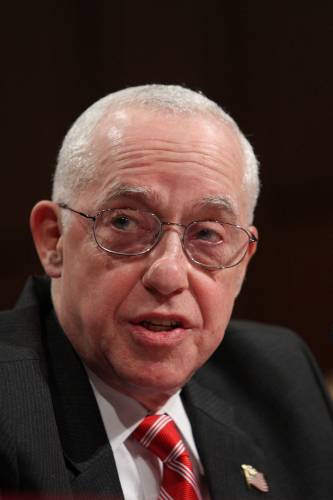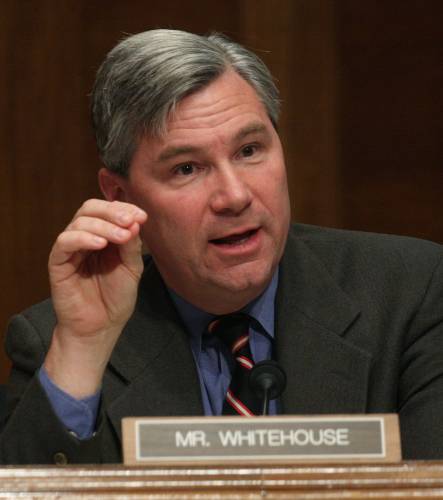Torture by Any Other Name
It looks unlikely that the next president will prosecute Bush administration officials for potential war crimes, to the frustration of some critics.
Jul 31, 2020106.2K Shares1.6M Views
Illustration by: Matt Mahurin
Before a packed crowd at the Netroots convention, Cass Sunstein, a law professor at Harvard and the University of Chicago and a legal adviser for Sen. Barack Obama, was asked how the next president should address the Bush administration’s potential war crimes. When Sunstein said the new adminstration must be cautious and not partisan in the use of the prosecutorial power, though egregious acrs should not be ignored, he was still met with a chorus of boos and angry rejoinders that the president and his Cabinet cannot remain above the law.
Since then, legal experts have generally agreed that the next administration is unlikely to prosecute Bush administration officials for authorizing the torture of suspected terrorists — no matter how many laws the government officials broke. But that hasn’t placated many others, like George Washington University Law Professor Jonathan Turley, or the constitutional lawyer and author Glenn Greenwald, who argue that holding policy-makers accountable for their actions is critical to restoring the reputation of the United States — not to mention respect for the rule of law.
Image has not been found. URL: http://www.washingtonindependent.com/wp-content/uploads/2008/09/scales-150x150.jpgIllustration by: Matt Mahurin
Indeed, how can a new president refuse to prosecute Bush administration officials for authorizing the same acts, like waterboarding, that the United States has previously prosecuted as contrary to U.S. and international law?
The Washington Post reportedTuesday that the Bush administration had issued secret memos in 2003 and 2004 explicitly endorsing the Central Intelligence Agency’s use of waterboarding and other harsh interrogation techniques — otherwise known as torture — against suspected terrorists.
Though Atty. Gen. Michael Mukasey still hasn’t said whether he believes waterboarding constitutes torture, the evidence of illegal conduct by senior administration officials is getting harder and harder to avoid.
In a recent address to the Assn. of Former U.S. Attorneys, Sen. Sheldon Whitehouse(D-R.I.), a former U.S. attorney, noted that waterboarding, which the Bush administration’s Office of Legal Counsel declared legal in 2002 (the Justice Dept. now claims the CIA no longer uses it as an interrogation technique), had long been considered torture. In fact, it had earlier been prosecuted by U.S. authorities.
“I was astounded that the research by the OLC, which supported determining that waterboarding was lawful, had huge gaps in it,” Whitehouse told The Washington Independent last week. “They went so far as to go find some Medicare reimbursement statute to serve their purpose. One strains to find the relevance of that to enemy prisoner interrogation.”
“There are a whole variety of far more relevant things they could have found if they had taken a look,” Whitehouse continued, noting that the U.S. itself prosecuted waterboarding of American soldiers after World War II; waterboarding by American soldiers in the Philippines, and “water torture,” as it’s also been called — most recently by a local sheriff in Texas.
Atty. Gen. Michael Mukasey (WDCpix)
Other legal experts — some still government officials — have made the same point. In the Columbia Journal of Transnational Law, for example, Evan Wallach, a judge on the U.S. Court of International Trade and expert on the laws of war, wrote: “Not so very long ago, the United States, acting alone before domestic courts, commissions and courts-martial, and as a participant in the world community, not only condemned the use of water torture, but severely punished as criminals those who applied it.”
Wallach declined to comment for this article, saying that these these issues could come before him or other federal judges. But in The Washington Postlast year, Wallach noted that, among other instances, the U.S. initiated war crimes prosecutions against Japanese soldiers who water-boarded U.S. pilots during World War II.
However, John Yoo and his colleagues at the Office of Legal Counsel didn’t need to look back that far to learn that the United States has long considered the practice illegal. As recently as 1983, as Whitehouse reminded the former U.S. attorneys earlier this month, the Justice Dept. itself prosecuted a Texas sheriff who had used waterboarding to extract confessions from arrested suspects. Six former inmates testified that they had been waterboarded between 1976 and 1980.
Some lawyers who participated in that case are still at the Justice Dept. today. None returned calls for comment. In its written opinion affirming the conviction of County Sheriff James Parker, of San Jacinto County, and his deputies, the Fifth Circuit Court of Appeals in 1984 referred to waterboarding as “torture” a total of 12 times.
At a Senate Judiciary Committee hearing in July, Mukasey, responding to questions about the waterboarding case, U.S. v. Lee, said it wasn’t relevant because the officers were prosecuted under the civil-rights laws. “It was not a case that dealt with whether a technique is or isn’t torture under the torture statutes,” Mukasey said.
Peter Carr, a Justice Department spokesman, told TWI yesterday that the Lee prosecution “was fully consistent with the legal advice OLC provided to the CIA.”
Though “the attorney general has not reached any legal conclusion concerning the lawfulness of the technique as used by the CIA,” Carr added, “Prior to his confirmation, the attorney general made clear that if waterboarding were torture, it would be unlawful both under the Anti-Torture Statute and the Constitution. He subsequently reviewed the opinions of the Office of Legal Counsel as they apply to current techniques and found the opinions to be correct and sound.”
In other words, the Justice Dept is still dodging the question of whether waterboarding is torture — and, therefore, whether those who approved it violated the law.
In the Lee case, however, neither the court nor the federal prosecutors appear to have had any question about whether drowning a prisoner just up to the point of death was torture. As the federal appellate court described it, “Lee was indicted along with two other deputies, Floyd Baker and James Glover, and the County Sheriff, James Parker, based on a number of incidents in which prisoners were subjected to a “water torture” in order to prompt confessions to various crimes.”
The case, accessible online or in any law library, was easily available to the Justice Dept., lawyers insist. Yet when Yoo drafted his now-infamous “torture memo” in 2002, he ignored such relevant cases and instead drew on an obscure Medicare reimbursement statute to define torture as pain “equivalent in intensity to the pain accompanying serious physical injury, such as organ failure, impairment of bodily function, or even death.”
That extreme language was then used to justify waterboarding. The federal anti-torture statute adopted in 1994, meanwhile, defines torture far more broadly, as an “act committed by a person acting under the color of law specifically intended to inflict severe physical or mental pain or suffering (other than pain or suffering incidental to lawful sanctions) upon another person within his custody or physical control.”
“Severe mental pain or suffering” is defined as “the prolonged mental harm caused by or resulting from,” among other things, “the intentional infliction or threatened infliction of severe physical pain or suffering;” “the administration or application, or threatened administration or application, of mind-altering substances or other procedures calculated to disrupt profoundly the senses or the personality,” or “the threat of imminent death.” It’s difficult to see how drowning until just before the point of death wouldn’t qualify.
Sen. Sheldon Whitehouse (WDCpix)
So how did Yoo miss the relevant law?
“Either the quality of their research was dismal,” said Whitehouse, who sits on the Senate Intelligence Committee, and therefore has reviewed many of the memos that remain classified, “or they did find it and they didn’t care to go through the intellectual exercise to distinguish it from the current situation. They wrote an 85-page opinion citing the Medicare statute, and none of the memos even mentioned these cases.”
Daniel Hedges, who was the U.S. attorney in the southern district of Texas leading Parker’s prosecution, recalled the case. “It was certainly a violation of the civil rights of these people, there was no question of that,” said Hedges. “The torture was certainly a part of it.”
Parker was convicted and sentenced to 10 years in prison. As The New York Times reported at the time, the sentencing judge told Parker that the sheriff had allowed law enforcement to “fall into the hands of a bunch of thugs….The operation down there would embarrass the dictator of a country.”
In fact, such actions a few years later led a U.S. federal court to hold Philippine President Ferdinand Marcos liable for $766 million, in part for having subjected political prisoners to waterboarding.
Sen. John McCain, who notes frequently that he was held prisoner by the North Vietnamese, has said of waterboarding: “It is not a complicated procedure. It is torture.”
Given the history of prosecutions, it’s hard to see how OLC, whose lawyers normally consult the relevant Justice Dept. lawyers, in addition to doing independent legal research, could have reached a different conclusion.
“Rather than bring people into the loop, they just made the decision between themselves and the vice president’s office,” said Whitehouse. “The vice president’s office clearly wanted a particular result and didn’t see the need to bring other people in who might disrupt the march toward that result.”
Jack Goldsmith, a Harvard Law professor who headed the OLC in 2003, has described his former office as a sort of “independent court inside the executive branch.” But not during much of the Bush presidency.
“As I absorbed the opinions,” he wrote in his book, “The Terror Presidency,” referring to the opinions issued by OLC after Sept. 11, 2001, “I concluded that some were deeply flawed: sloppily reasoned, overbroad and incautious in asserting extraordinary constitutional authorities on behalf of the president….I was astonished, and immensely worried, to discover that some of our most important counterterrorism policies rested on severely damaged legal foundations.” (Goldsmith declined to be interviewed for this article.)
To Whitehouse, the memos reveal “embarrassing, fire-the-associate quality legal research and analysis.” That’s “a sickening fall from grace for an office that’s always been a source of real pride.”
But to Bush administration officials, such shoddy lawyering may mean something far worse than embarrassment: the sort of deliberate misstatements of the law that will protect neither the lawyers nor their clients from subsequent prosecution.
In September, Secretary of State Condoleezza Rice provided new testimony, confirming that the White House was actively involved in talks over the CIA’s use of torture in the interrogation of prisoners in 2002 and 2003. That means that the responsibility for those practices, despite the legal memos justifying them, may well reach all the way up the chain of command.
It is going to be up to the next president to decide whether those commanders should be held in any way accountable.

Rhyley Carney
Reviewer
Latest Articles
Popular Articles


